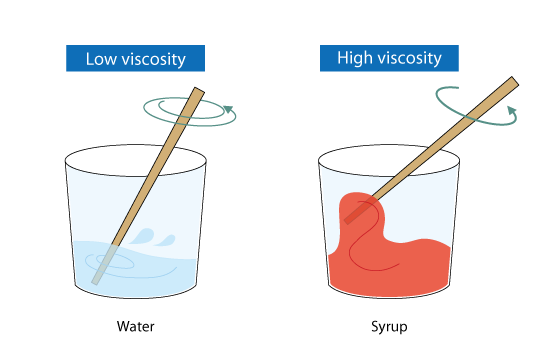
noun, plural vis·cos·i·ties.
- the state or quality of being viscous.
- Physics.
- the property of a fluid that resists the force tending to cause the fluid to flow.
- the measure of the extent to which a fluid possesses this property.
noun plural -ties
- the state or property of being viscous
- physics
- the extent to which a fluid resists a tendency to flow
- Also called: absolute viscositya measure of this resistance, equal to the tangential stress on a liquid undergoing streamline flow divided by its velocity gradient. It is measured in newton seconds per metre squaredSymbol: η See also kinematic viscosity, specific viscosity
early 15c., from Old French viscosite or directly from Medieval Latin viscositas, from Latin viscosus (see viscous).
n.
- The condition or property of being viscous.
- The degree to which a fluid resists flow under an applied force, measured by the tangential friction force per unit area divided by the velocity gradient under conditions of streamline flow; coefficient of viscosity.
- The resistance of a substance to flow. For example, water has a lower viscosity than molasses and flows more easily. Viscosity is related to the concept of shear force; it can be understood as the effect of different layers of the fluid exerting shearing force on each other, or on other surfaces, as they move against each other. Viscosity lies behind the skin friction component of drag.♦ Kinematic viscosity is a measure of the rate at which momentum is transferred through a fluid. It is measured in stokes.♦ Dynamic viscosity is a measure of the ratio of the stress on a region of a fluid to the rate of change of strain it undergoes. It is equal to the kinematic viscosity times the density of the fluid. It is measured in pascal-seconds or poises.
The internal friction of a fluid, produced by the movement of its molecules against each other. Viscosity causes the fluid to resist flowing.
 Liberal Dictionary English Dictionary
Liberal Dictionary English Dictionary